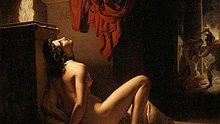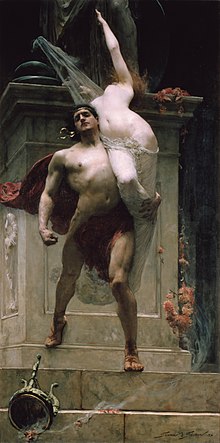User:RavensandStars/Cassandra
Biography[edit]
Cassandra was one of the many children born to the king and queen of Troy, Priam and Hecuba. She is the fraternal twin sister of Helenus, as well as the sister to Hector and Paris[1]. One of the oldest and common versions of her myth follows that Cassandra was admired by the god Apollo, who sought to win her with the gift to see the future. According to the Greek author, Aeschylus, Cassandra promised Apollo favors, but after receiving the gift, Cassandra went back on her word and refused Apollo. Enraged, as Apollo couldn't revoke a divine power, he added to the curse that though Cassandra could see the future, nobody would believe her prophecies. She's become a figure of epic tradition and of tragedy.She makes appearances in classical texts like that of Homer, Virgil, and in playwrights produced by Aeschylus and Euripides.
Mythology[edit]
Cassandra does appear in other ancient Greek literature such as texts written by Homer, Virgil, Aeschylus and Euripides and her prophetic powers are depicted differently in each author's interpretation of her and her myth. In Homer's work, Homer writes out Cassandra's powers and mentions her a total of four times "as a virgin daughter of Priam, as bewailing Hektor’s death, as chosen by Agamemnon as his slave mistress after the sack of Troy, and as killed by Klytaimestra over Agamemnon’s corpse after Klytaimestra murders him on his return home.[2]"
In Virgil's work, Cassandra appears in book two of his epic poem titled Aeneid, with her powers of prophecy back. Unlike with Homer's work, Cassandra is presented as haven fallen into a manic state[3] and her prophecies reflect it. In book 2, she gives her prophecy of why Agamemnon deserves the death he got:
Quid me vocatis sospitem solam e meis, umbrae meorum? te sequor, tota pater Troia sepulte; frater, auxilium Phrygum terrorque Danaum, non ego antiquum decus video aut calentes ratibus ambustis manus, sed lacera membra et saucios vinclo gravi illos lacertos. te sequor… (Ag. 741–747)
Why do you call me, the lone survivor of my family, My shades? I follow you, father buried with all of Troy; Brother, bulwark of Trojans, terrorizer of Greeks, I do not see your beauty of old or hands warmed by burnt ships, But your lacerated limbs and those famous shoulders savaged By heavy chains. I follow you…[4]
Later on in Virgil's work, this behavior is reflected in act's 4 and 5 as "Her mantic vision in act 4 will be supplemented by a further (in)sight into what is going on inside the palace in act 5 when she becomes a quasi-messenger and provides a meticulous account of Agamemnon’s murder in the bath: “I see and I am there and I enjoy it, no false vision deceives my eyes: let’s watch” (video et intersum et fruor, / imago visus dubia non fallit meos: / spectemus[5]."
Gift of prophecy[edit]
Apollo gifts Cassandra with her powers to be able to tell prophecies, but is also is the one to curse Cassandra after she refuses to uphold her end of their bargain. In Aeschylus' Agamemnon, she bemoans her relationship with Apollo:
Apollo, Apollo!
God of all ways, but only Death's to me,
Once and again, O thou, Destroyer named,
Thou hast destroyed me, thou, my love of old!
And she acknowledges her fault:
I consented [marriage] to Loxias [Apollo] but broke my word. ... Ever since that fault I could persuade no one of anything.[6]
Louise Bogan, an American poet, writes that another way Cassandra, as well as her twin brother Helenus, had earned their prophetic powers: "she and her brother Helenus were left overnight in the temple of the Thymbraean Apollo. No reason has been advanced for this night in the temple; perhaps it was a ritual routinely performed by everyone. When their parents looked in on them the next morning, the children were entwined with serpents, which flicked their tongues into the children's ears. This enabled Cassandra and Helenus to divine the future." It would not be until Cassandra is much older that Apollo appears in the same temple and tried to seduce Cassandra, who rejects his advances, and curses her by making her prophecies not be believed. [7]
Her cursed gift from Apollo became an endless pain and frustration to her. She was seen as a liar and a madwoman by her family and by the Trojan people. Because of this, her father, Piram, had locked her away in a chamber and guarded her like the madwoman she was believed to be[8]. Though Cassandra made many predictions that went unbelieved, the one prophecy that was believed was that of Paris being her abandoned brother.[9]
Etymology[edit]
Hjalmar Frisk (Griechisches Etymologisches Wörterbuch, Heidelberg, 1960–1970) notes "unexplained etymology", citing "various hypotheses" found in Wilhelm Schulze, Edgar Howard Sturtevant, J. Davreux, and Albert Carnoy. R. S. P. Beekes cites García Ramón's derivation of the name from the Proto-Indo-European root *(s)kend- "raise". The Online Etymology Dictionary states "though the second element looks like a fem. form of Greek andros "of man, male human being." Watkins suggests PIE *(s)kand- "to shine" as source of second element. The name also has been connected to kekasmai "to surpass, excel[10]."
The Fall of Tory[edit]
Before the fall of Troy[edit]
Before the fall of Troy took place, Cassandra foresaw that if Paris goes to Sparta and brings Helen back as his wife, the arrival of Helen would spark the downfall and destruction of Troy during the Trojan War. Despite the prophecy and ignoring Cassandra's warning, Paris still went to Troy and returns with Helen. While the people of Tory rejoice, Cassandra, angry with Helen's arrival, furiously snatched away Helen's golden veil and tore at her hair[11].
In Virgil's epic poem, the Aeneid, Cassandra warned the Trojans about the Greeks hiding inside the Trojan Horse, Agamemnon's death, her own demise at the hands of Aegisthus and Clytemnestra, her mother Hecuba's fate, Odysseus's ten-year wanderings before returning to his home, and the murder of Aegisthus and Clytemnestra by the latter's children Electra and Orestes. Cassandra predicted that her cousin Aeneas would escape during the fall of Troy and found a new nation in Rome [12]
During the fall of Troy[edit]
In The Fall of Troy, told by Quintus Smyrnaeus, Cassandra had attempted to warn the Trojan people that Greek warriors were hiding in the Trojan Horse while they were celebrating their victory over the Greeks with feasting. Disbelieving Cassandra, the Greeks resort to calling her names and hurling insults at her. Attempting to prove herself right, Cassandra took an axe in one hand and a burning torch in the other, and ran towards the Trojan Horse, intent on destroying the Greeks herself, but the Trojans stopped her. The Greeks hiding inside the Horse were relieved, but alarmed by how clearly she had divined their plan.[13]
At the fall of Troy, Cassandra sought shelter in the temple of Athena. There she embraced the wooden statue of Athena in supplication for her protection, but was abducted and brutally raped by Ajax the Lesser.Cassandra clung so tightly to the statue of the goddess that Ajax knocked it from its stand as he dragged her away. The actions of Ajax were a sacrilege because Cassandra was a supplicant at the sanctuary, and under the protection of the goddess Athena and Ajax further defiled the temple by raping Cassandra[14]. In Apollodorus chapter 6, section 6, Ajax's death comes at the hands of both Athena and Poseidon "Athena threw a thunderbolt at the ship of Ajax; and when the ship went to pieces he made his way safe to a rock, and declared that he was saved in spite of the intention of Athena. But Poseidon smote the rock with his trident and split it, and Ajax fell into the sea and perished; and his body, being washed up, was buried by Thetis in Myconos"[15].


The aftermath of Troy and Cassandra's death[edit]
Once Troy had fallen, Cassandra was taken as a pallake (concubine) by King Agamemnon of Mycenae. While away at war and unknown to Agamemnon, his wife, Clytemnestra, had taken Aegisthus as her lover. Cassandra and Agamemnon is later killed by both Clytemnestra and Aegisthus. Various sources state that Cassandra and Agamemnon had two twin boys, Teledamus and Pelops, who were murdered by Aegisthus[16].
The final resting place of Cassandra is either in Amyclae or Mycenae. In Amycale, Cassandra has statue in both there and in Leuctra. In Mycenae, German business man and pioneer archeologist Heinrich Schliemann discovered in Grave Circle A the graves of Cassandra and Agamemnon and telegraphed back to King George of Greece:
With great joy I announce to Your Majesty that I have discovered the tombs which the tradition proclaimed by Pausanias indicates to be the graves of Agamemnon, Cassandra, Eurymedon and their companions, all slain at a banquet by Clytemnestra and her lover Aegisthos.
However, it was later discovered that the graves predated the Trojan War by at least 300 years[17].
- ^ "Apollodorus, Library, book 3, chapter 12, section 5". www.perseus.tufts.edu. Retrieved 2021-11-10.
- ^ Dillion, Matthew. "Kassandra: Mantic, Maenadic or Manic? Gender and the Nature of Prophetic Experience in Ancient Greece". openjournals.library.sydney.edu.au. Retrieved 2021-11-27.
{{cite web}}: line feed character in|title=at position 38 (help)CS1 maint: url-status (link) - ^ Trinacty, Christopher V. (2016). "CATASTROPHE IN DIALOGUE: AENEID 2 AND SENECA'S AGAMEMNON". Vergilius (1959-). 62: 108–108. ISSN 0506-7294.
- ^ Trinacty, Christopher V. (2016). "CATASTROPHE IN DIALOGUE: AENEID 2 AND SENECA'S AGAMEMNON". Vergilius (1959-). 62: 109–109. ISSN 0506-7294.
- ^ Trinacty, Christopher V. (2016). "CATASTROPHE IN DIALOGUE: AENEID 2 AND SENECA'S AGAMEMNON". Vergilius (1959-). 62: 110–111. ISSN 0506-7294.
- ^ "Aeschylus, Agamemnon, line 1202". www.perseus.tufts.edu. Retrieved 2021-11-28.
- ^ Bogan, Louise. "Cassandra in the Classical World". maps-legacy.org. Retrieved 2021-11-28.
{{cite web}}: CS1 maint: url-status (link) - ^ Bogan, Louise. "Cassandra in the Classical World". maps-legacy.org. Retrieved 2021-11-28.
{{cite web}}: CS1 maint: url-status (link) - ^ "Cassandra". Retrieved 11/27/2021.
{{cite web}}: Check date values in:|access-date=(help)CS1 maint: url-status (link) - ^ "Online Etymology Dictionary". Online Etymology Dictionary. Retrieved 11/27/2021.
{{cite web}}: Check|archive-url=value (help); Check date values in:|access-date=(help)CS1 maint: url-status (link) - ^ "Cassandra - Greek Mythology Link". www.maicar.com. Retrieved 2021-11-28.
- ^ "The Internet Classics Archive | The Aeneid by Virgil". classics.mit.edu. Retrieved 2021-11-28.
- ^ Smyrnaeus, Quintus. "THE FALL OF TROY BOOK 12". www.theoi.com. Retrieved 2021-11-28.
{{cite web}}: CS1 maint: url-status (link) - ^ "Cassandra, Ancient Princess of Troy, Priestess and Prophetess". The Role of Women in the Art of Ancient Greece. Retrieved 2021-11-28.
- ^ "Apollodorus, Epitome, book E, chapter 6, section 6". www.perseus.tufts.edu. Retrieved 2021-11-28.
- ^ "Pausanias, Description of Greece, Corinth, chapter 16, section 6". www.perseus.tufts.edu. Retrieved 2021-11-28.
- ^ Harrington, Spencer P.M. (July/August 1999). "Behind the Mask of Agamemnon". Archaeological Institute of America. 52.
{{cite journal}}: Check date values in:|date=(help)
